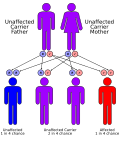Familial dysautonomia

Editor-In-Chief: Prab R Tumpati, MD
Obesity, Sleep & Internal medicine
Founder, WikiMD Wellnesspedia &
W8MD's medical weight loss NYC, sleep center NYC
Philadelphia medical weight loss and Philadelphia sleep clinics
| Familial dysautonomia | |
|---|---|

| |
| Synonyms | N/A |
| Pronounce | N/A |
| Specialty | N/A |
| Symptoms | Hypotonia, feeding difficulties, autonomic crises, insensitivity to pain, dysautonomia |
| Complications | N/A |
| Onset | Infancy |
| Duration | Lifelong |
| Types | N/A |
| Causes | Genetic mutation in the IKBKAP gene |
| Risks | Ashkenazi Jewish descent |
| Diagnosis | Genetic testing, clinical evaluation |
| Differential diagnosis | Riley-Day syndrome, other hereditary sensory and autonomic neuropathies |
| Prevention | N/A |
| Treatment | Supportive care, symptomatic treatment |
| Medication | N/A |
| Prognosis | Variable, with improved outcomes due to early diagnosis and management |
| Frequency | Rare, primarily in individuals of Ashkenazi Jewish descent |
| Deaths | Historically high, but improving with advances in care |
A genetic disorder affecting the autonomic nervous system
Familial dysautonomia (FD), also known as Riley-Day syndrome, is a rare genetic disorder that affects the development and function of the autonomic nervous system and sensory nervous system. It is classified as a type of hereditary sensory and autonomic neuropathy (HSAN).
Genetics[edit]
Familial dysautonomia is an autosomal recessive disorder, meaning that an individual must inherit two copies of the defective gene, one from each parent, to be affected. The disorder is caused by mutations in the IKBKAP gene, which is located on chromosome 9. This gene is responsible for producing a protein called IKAP, which is involved in the development and maintenance of nerve cells.
Symptoms[edit]
The symptoms of familial dysautonomia are varied and can affect multiple systems of the body. Common symptoms include:
- Poor muscle tone (hypotonia)
- Feeding difficulties
- Lack of tears (alacrima)
- Frequent lung infections
- Difficulty regulating body temperature
- Episodes of dysautonomic crisis, characterized by vomiting, sweating, and changes in blood pressure and heart rate
- Scoliosis
- Poor growth and delayed development
Diagnosis[edit]
Diagnosis of familial dysautonomia is typically based on clinical evaluation and genetic testing. A blood test can identify mutations in the IKBKAP gene, confirming the diagnosis. Prenatal testing is also available for families with a known history of the disorder.
Management[edit]
There is no cure for familial dysautonomia, but treatment focuses on managing symptoms and improving quality of life. Management strategies may include:
- Nutritional support, such as feeding tubes
- Medications to control blood pressure and heart rate
- Physical therapy to improve muscle tone and coordination
- Regular monitoring and treatment of lung infections
- Surgery to correct scoliosis or other skeletal abnormalities
Prognosis[edit]
The prognosis for individuals with familial dysautonomia varies. Advances in medical care have improved life expectancy and quality of life for many patients. However, the disorder remains serious and can lead to complications that affect daily living.
Epidemiology[edit]
Familial dysautonomia is most commonly found in individuals of Ashkenazi Jewish descent, with a carrier frequency of approximately 1 in 30 in this population. It is much rarer in other ethnic groups.
Familial dysautonomia images[edit]
-
No Tears Life With FD
-
Autorecessive
See also[edit]
Ad. Transform your life with W8MD's Budget GLP-1 injections from $75


W8MD offers a medical weight loss program to lose weight in Philadelphia. Our physician-supervised medical weight loss provides:
- Weight loss injections in NYC (generic and brand names):
- Zepbound / Mounjaro, Wegovy / Ozempic, Saxenda
- Most insurances accepted or discounted self-pay rates. We will obtain insurance prior authorizations if needed.
- Generic GLP1 weight loss injections from $75 for the starting dose.
- Also offer prescription weight loss medications including Phentermine, Qsymia, Diethylpropion, Contrave etc.
NYC weight loss doctor appointmentsNYC weight loss doctor appointments
Start your NYC weight loss journey today at our NYC medical weight loss and Philadelphia medical weight loss clinics.
- Call 718-946-5500 to lose weight in NYC or for medical weight loss in Philadelphia 215-676-2334.
- Tags:NYC medical weight loss, Philadelphia lose weight Zepbound NYC, Budget GLP1 weight loss injections, Wegovy Philadelphia, Wegovy NYC, Philadelphia medical weight loss, Brookly weight loss and Wegovy NYC
|
WikiMD's Wellness Encyclopedia |
| Let Food Be Thy Medicine Medicine Thy Food - Hippocrates |
Medical Disclaimer: WikiMD is not a substitute for professional medical advice. The information on WikiMD is provided as an information resource only, may be incorrect, outdated or misleading, and is not to be used or relied on for any diagnostic or treatment purposes. Please consult your health care provider before making any healthcare decisions or for guidance about a specific medical condition. WikiMD expressly disclaims responsibility, and shall have no liability, for any damages, loss, injury, or liability whatsoever suffered as a result of your reliance on the information contained in this site. By visiting this site you agree to the foregoing terms and conditions, which may from time to time be changed or supplemented by WikiMD. If you do not agree to the foregoing terms and conditions, you should not enter or use this site. See full disclaimer.
Credits:Most images are courtesy of Wikimedia commons, and templates, categories Wikipedia, licensed under CC BY SA or similar.
Translate this page: - East Asian
中文,
日本,
한국어,
South Asian
हिन्दी,
தமிழ்,
తెలుగు,
Urdu,
ಕನ್ನಡ,
Southeast Asian
Indonesian,
Vietnamese,
Thai,
မြန်မာဘာသာ,
বাংলা
European
español,
Deutsch,
français,
Greek,
português do Brasil,
polski,
română,
русский,
Nederlands,
norsk,
svenska,
suomi,
Italian
Middle Eastern & African
عربى,
Turkish,
Persian,
Hebrew,
Afrikaans,
isiZulu,
Kiswahili,
Other
Bulgarian,
Hungarian,
Czech,
Swedish,
മലയാളം,
मराठी,
ਪੰਜਾਬੀ,
ગુજરાતી,
Portuguese,
Ukrainian

